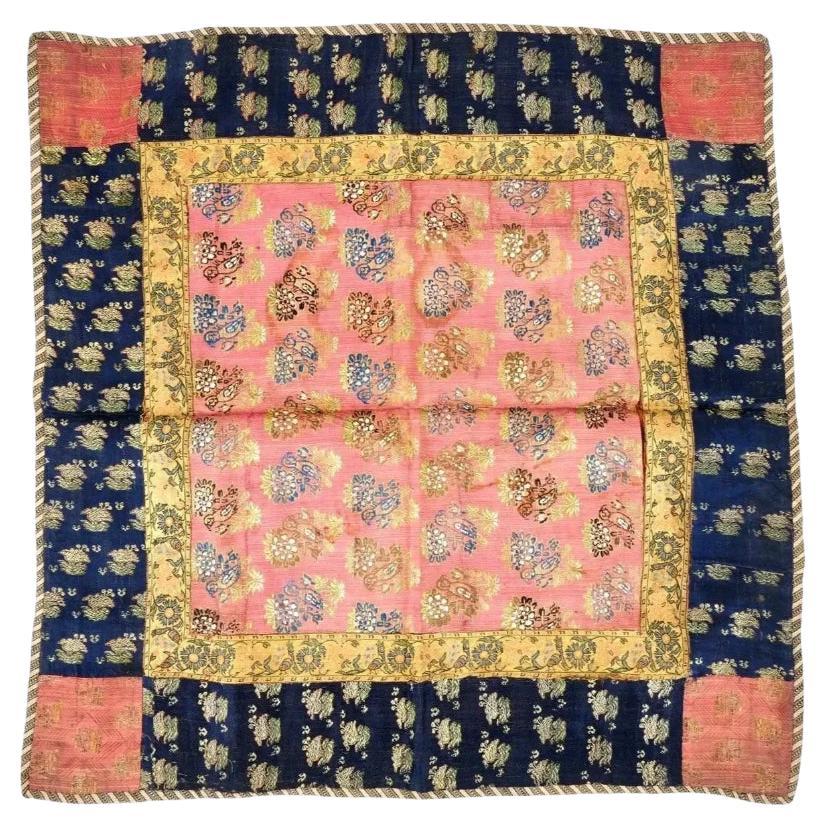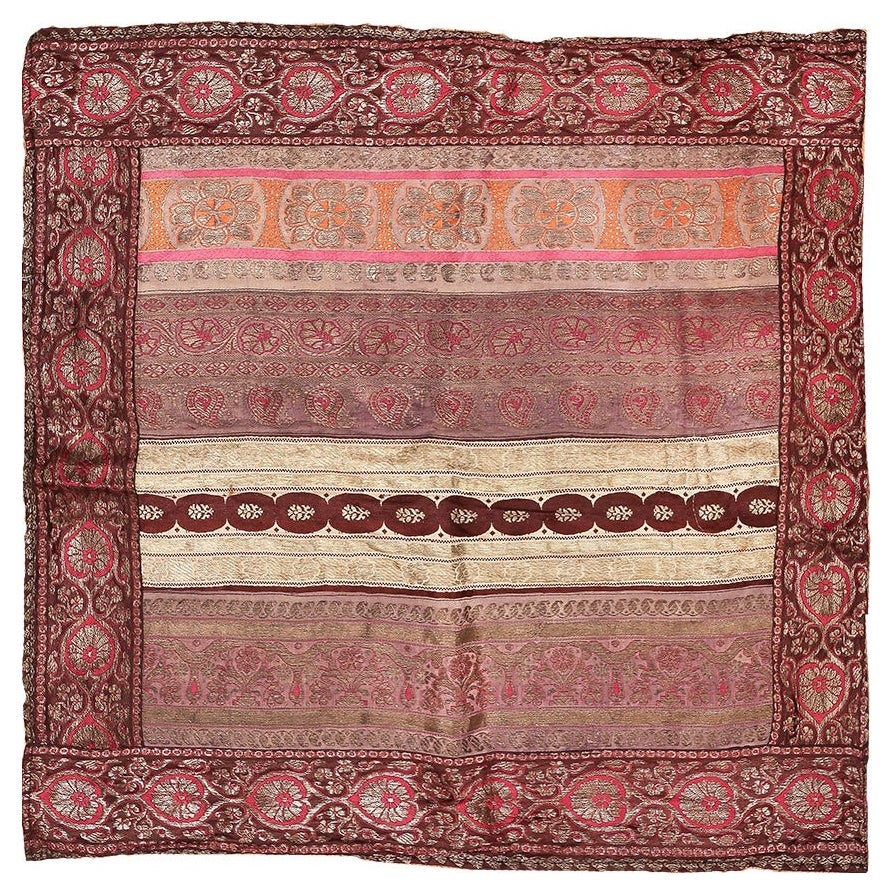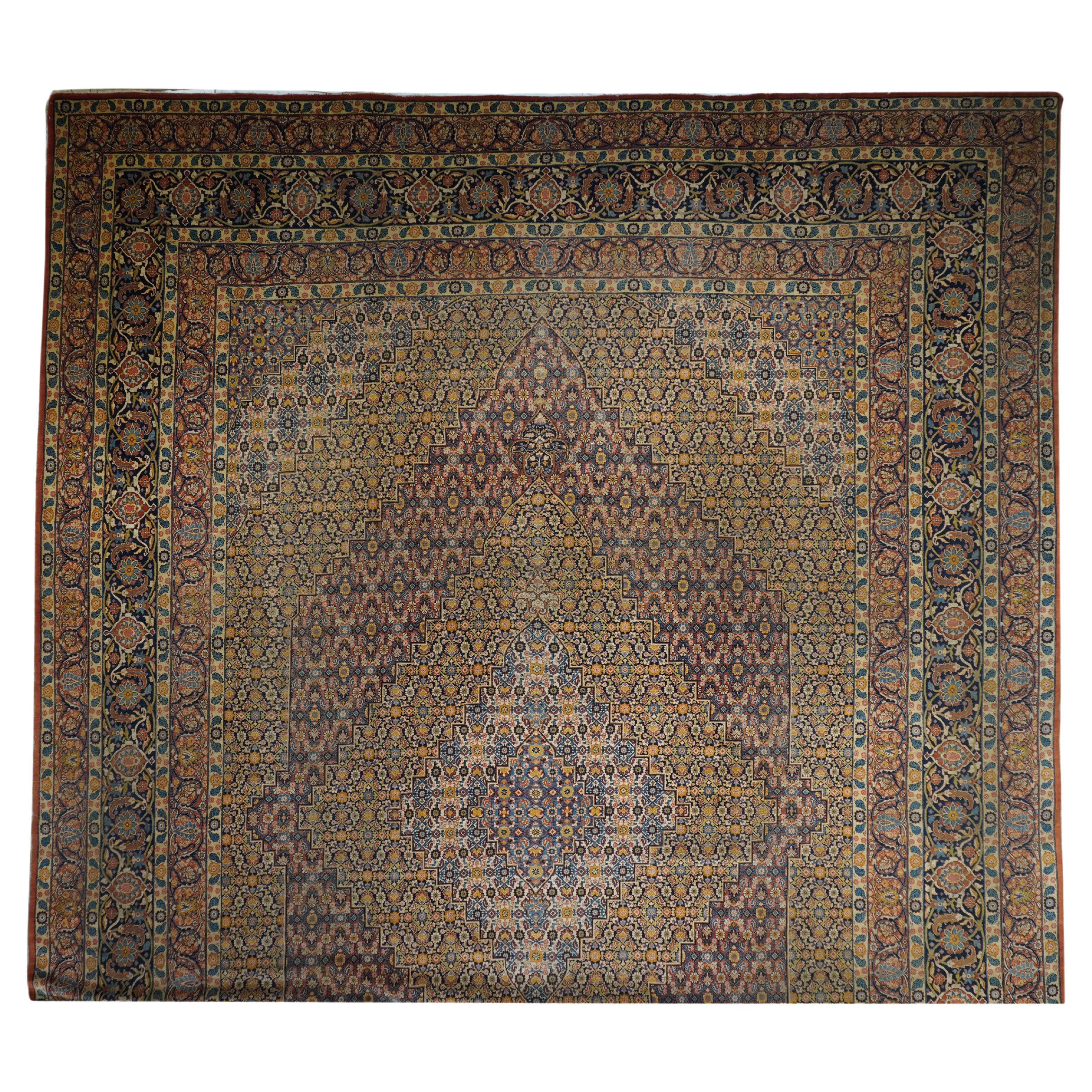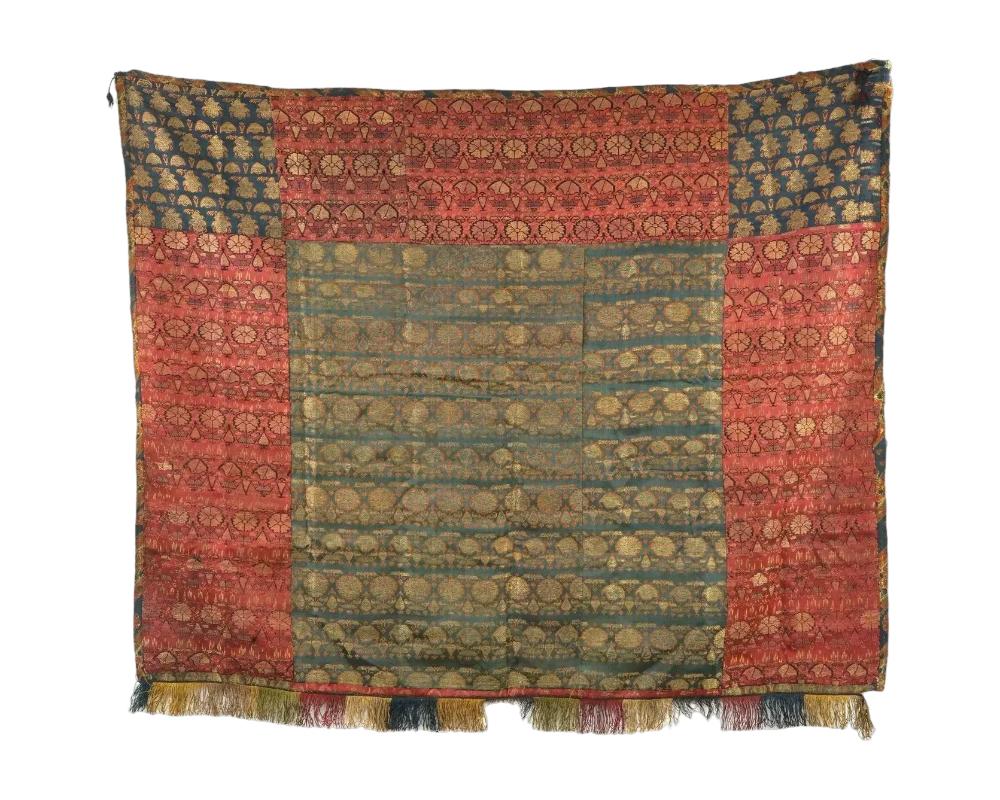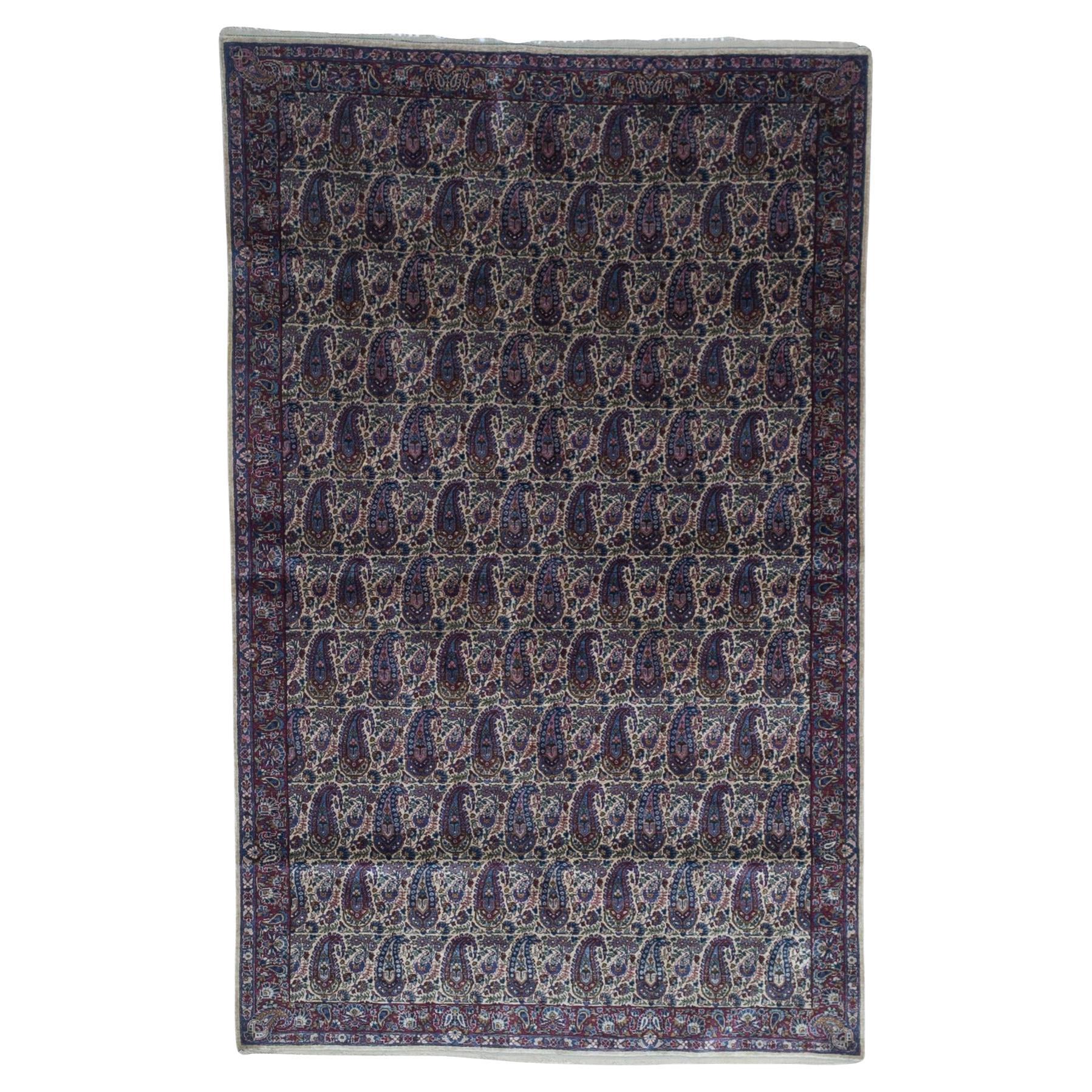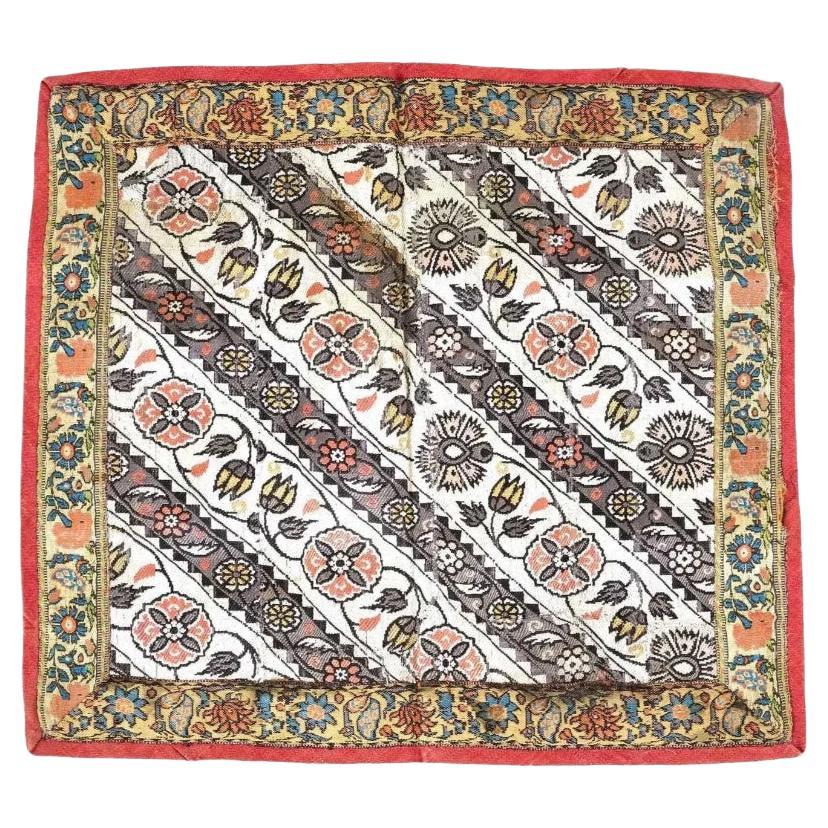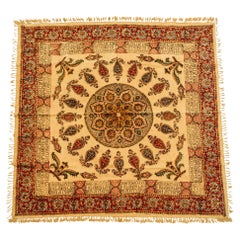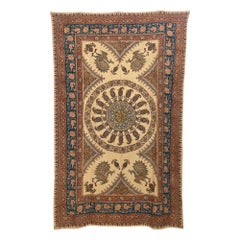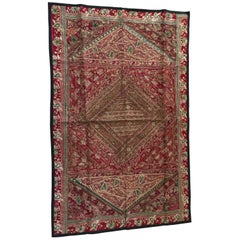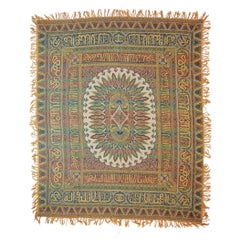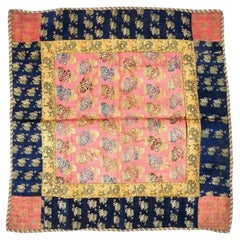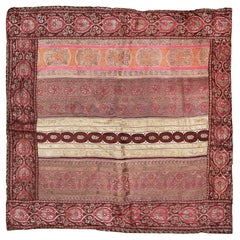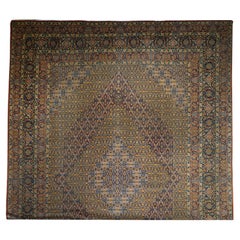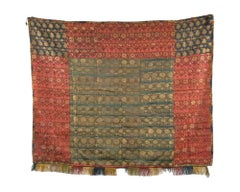Items Similar to Persian Kalamkar Hand-Blocked Tapestry Textile Isfahan
Video Loading
Want more images or videos?
Request additional images or videos from the seller
1 of 21
Persian Kalamkar Hand-Blocked Tapestry Textile Isfahan
$1,250
£949.15
€1,085.43
CA$1,746.43
A$1,942.41
CHF 1,014.27
MX$23,637.10
NOK 12,953.75
SEK 12,148.33
DKK 8,100.97
Shipping
Retrieving quote...The 1stDibs Promise:
Authenticity Guarantee,
Money-Back Guarantee,
24-Hour Cancellation
About the Item
An absolutely gorgeous example of the traditional Antique Persian hand-blocked tapestry textile.
Persian Kalamkar (Qalamkar or Ghalamkar) woodblock print textile is from the great city of Isfahan.
Gorgeous piece with very fine work that the creator had put in to make a complex design based on paisley and birds design in the middle and a border with a repeat design featuring a man and a ladies playing music and another lady pouring wine to the host who is enjoying the music.
Hand blocked vegetable and iron oxide dyes on cotton. The fabric is printed using patterned wooden stamps.
The colors are muted, blue, red, yellow and beige linen background.
Since it is block printed the design shows only in front, the back is plain linen.
From an estate in Beverly Hills CA dated circa1920-1921.
It has hand-braided fringes at the edges.
The condition is excellent.
Dimensions: 57” x 59” not including the 1/2” fringes.
This piece is light enough to hang on the wall, or it could serve as a table covering for a special mezza table, throw over the coah or bed cover. Regardless of how you decide to use it in your home or office, it is a magnificent piece of Persian style folk art.
Ghalamkar: The Art of Hand-Printed Textiles.
Qalamkari literally “pen-workmanship,” are block-printed and hand-painted cotton textiles that are used for wall-hangings, bed-coverings, table-coverings and other functions. Kalamkari is a form of Persian woodblock printed textile that originates from Esfahan in central Iran over 400 years ago.
The art of textile printing involves the manual application of color to fabric, resulting in intricate patterns and designs. In Isfahan, Iran, this traditional craft known as Ghalamkar thrives as both an artistic expression and a prominent trade. Skilled artisans utilize engraved wooden blocks to imprint patterns onto textiles, employing durable and rigid blocks typically crafted from pear tree wood.
The process begins by immersing the textiles in river water for a full day. Subsequently, they are treated with a paste made from pomegranate peel powder, granting them a creamy hue. Within the workshop, the artist initially prints the base patterns on the fabric using a black woodblock, after which an array of vibrant woodblocks is employed to add color to the designs. The textiles are then subjected to steaming, immersed in water, and stirred in a mixture of hot water, pomegranate peel, and alizarin. Finally, they are hung to dry, securing the vivid colors onto the fabric.
Cotton is the primary material used for these textiles, though historically, natural dyes derived from plants, animals, and minerals were utilized for printing patterns. However, due to the complexities of fixing natural dyes onto fabric, chemical dyes have become the preferred choice in modern times.
The art of engraving wooden blocks holds a significant place in Isfahan's cultural heritage. Regrettably, only a handful of craftsmen continue to practice this delicate art form today. The meticulous process of engraving intricate patterns onto a wooden block poses a challenge, requiring immense skill and precision.
The patterns found in Ghalamkar textiles are diverse and often draw inspiration from Persian miniature paintings. The desirability of the patterns increases with the level of talent and expertise demonstrated by the artist. Some common themes include historical landmarks, animals, miniatures, musicians, flowers and trees, depictions of renowned poets, ancient tales from Persian literature, and scenes depicting lovers.
The art of Ghalamkar textile printing has persisted in Isfahan since the Safavid dynasty and continues to flourish in the present day, embodying a rich legacy of craftsmanship and creativity.
Rugs and textiles possess a remarkable ability to forge connections with us, becoming cherished companions as we spend time appreciating them as works of art. It is awe-inspiring to contemplate the boundless talent and creativity of the individuals who crafted these pieces. Both men and women push their limits to fashion these marvelous objects, intended to captivate our eyes, touch our hearts, and stimulate our minds.
As passionate seekers of collectors who share our deep appreciation for the treasures we encounter during our travels, we derive immense joy from discovering and acquiring these objects, many of which have graced our personal collection. However, there comes a time when we must pass them on to new owners, allowing them to embark on their own adventures. We sincerely hope that as you spend time with and study these magnificent items, you will also come to cherish the love and individuality imbued by the talented artists who brought them to life.
Calico: The Ancient Craft of Iranian Fabric Painting
Calico, an ancient craft of Iran, enjoyed centuries of fame and prominence. Its popularity soared during the Mongol era in Iran when fabric painting, including Chinese painted fabric, gained significant market shares with the support of Mongol chiefs. In an effort to tap into this market, Iranians devised their own distinct painted fabric known as Calico.
Ghalamkar, also spelled as Qalamkaar or Qalamkar, is a type of textile printing that produces patterned Iranian fabric. This method involves the use of patterned wooden stamps to print designs onto the fabric. In India, a similar technique is known as Kalamkari, which encompasses both hand-painted and block-printed cotton textiles.
The term "Ghalamkar" originates from the Persian words "ghalam" (pen) and "kari" (craftsmanship), signifying the art of drawing with a pen. Additionally, the term "čīt" refers to cotton cloth adorned with block-printed or painted designs in multiple colors. This term made its way into the English language as "chintz," now commonly used to describe any cotton or linen furnishing fabric printed with floral designs in fast colors.
- Dimensions:Height: 59 in (149.86 cm)Width: 57 in (144.78 cm)Depth: 0.1 in (2.54 mm)
- Style:Islamic (In the Style Of)
- Materials and Techniques:
- Place of Origin:
- Period:
- Date of Manufacture:1920
- Condition:
- Seller Location:North Hollywood, CA
- Reference Number:Seller: PT7231stDibs: LU906835134682
About the Seller
5.0
Platinum Seller
Premium sellers with a 4.7+ rating and 24-hour response times
1stDibs seller since 2011
3,059 sales on 1stDibs
Typical response time: 1 hour
- ShippingRetrieving quote...Shipping from: North Hollywood, CA
- Return Policy
Authenticity Guarantee
In the unlikely event there’s an issue with an item’s authenticity, contact us within 1 year for a full refund. DetailsMoney-Back Guarantee
If your item is not as described, is damaged in transit, or does not arrive, contact us within 7 days for a full refund. Details24-Hour Cancellation
You have a 24-hour grace period in which to reconsider your purchase, with no questions asked.Vetted Professional Sellers
Our world-class sellers must adhere to strict standards for service and quality, maintaining the integrity of our listings.Price-Match Guarantee
If you find that a seller listed the same item for a lower price elsewhere, we’ll match it.Trusted Global Delivery
Our best-in-class carrier network provides specialized shipping options worldwide, including custom delivery.More From This Seller
View AllIsfahan Ghalamkar Persian Paisley Textile Block Printed 1950s
Located in North Hollywood, CA
Vintage large square Isfahan block printed cotton hand printed fabric bedspread or wall Hanging Textile or table cloth.
Isfahan Ghalamkar Persian Paisley Kalamkari textile hand block...
Category
Mid-20th Century Unknown Islamic Textiles
Materials
Fabric
Large Isfahan Ghalamkar Persian Paisley Textile Block Printed 1950s
Located in North Hollywood, CA
Vintage large Isfahan block printed cotton hand printed fabric bedspread or wall Hanging Textile or table cloth.
Persian Paisley Kalamkari textile hand b...
Category
Mid-20th Century Asian Islamic Textiles
Materials
Cotton
Hand Embroidered Mughal silk and metal threaded tapestry, India
By Rajhastani
Located in North Hollywood, CA
Hand embroidered and quilted textile from North India.
Large Mughal silk and metal threaded tapestry
Fanciful Asian folk designs this distinctive quilt wor...
Category
20th Century Indian Anglo Raj Textiles
Materials
Silk
Antique Large Moorish Silk Textile Granada Spain Islamic Art
Located in North Hollywood, CA
Antique Large Moorish Silk Textile Granada, Islamic Spain.
Spanish Moorish Woven Tapestry Granada Spain Islamic Art.
From Granada, Islamic Spain, fabulou...
Category
Early 20th Century Spanish Moorish Textiles
Materials
Silk
Paisley Kalamkari Textile from India
Located in North Hollywood, CA
1930s Paisley Kalamkari textile from India.
Hand blocked vegetable and iron oxide dyes on cotton.
The fabric is printed using patterned wooden st...
Category
Early 20th Century Indian Islamic Quilts and Blankets
Materials
Cotton
Antique Hand-Knotted Rug from Turkey
Located in North Hollywood, CA
Antique hand-knotted rug from Eastern Turkey,
circa 1940.
Size: 3 ft 9 in x 6 ft 5 in.
Traditional Turkish design and hearth colors in pink, rust, grey and beige.
Flat pile rug w...
Category
Early 20th Century Turkish Bohemian Textiles
Materials
Wool
You May Also Like
17Th C Antique Persian Safavid Hand Woven Textile
Located in Long Island City, NY
An antique Persian Iranian Safavid dynasty hand woven embroidered textile. Circa: 17th century. The textile displays intricate hand woven patterns featuring repeating golden birds an...
Category
Antique 17th Century Unknown Textiles
Materials
Textile
$1,204 Sale Price
40% Off
Beautiful Antique Silk Persian Kerman Textile 2' x 2'
Located in New York, NY
Beautiful Antique Silk Persian Kerman Textile, Country of Origin / Rug Type: Persian Rug, Circa Date: Early 20th Century
Category
Early 20th Century Persian Kirman Persian Rugs
Materials
Silk
Antique Persian Haji Jalili Tabriz Rug 13’6” x 18’7”
Located in New York, NY
Antique Persian Haji Jalili Tabriz Rug 13’6” x 18’7”. The well-woven to finely knotted 1890 to 1910 pieces woven in the eponymous workshop or its copyists, in Tabriz, in formats ran...
Category
Antique Late 19th Century Persian Persian Rugs
Materials
Wool, Cotton
17Th Cen Persian Safavid Dynasty Embroidered Textile
Located in Long Island City, NY
An antique Persian Iranian Safavid dynasty hand woven embroidered textile wall hanging. The textile is adorned with floral, foliage and foliate scroll ornaments. The ware is decorate...
Category
Antique 17th Century Unknown Textiles
Materials
Textile
$3,604 Sale Price
40% Off
Extremely Fine Antique Persian Silk Mohtasham Kashan Rug 4'2" x 6’9"
Located in New York, NY
Extremely Fine Antique Persian Silk Mohtasham Kashan Rug 4'2" x 6’9". The Revival Period rugs woven by two generations of Mohtashams, from 1880 to WWI, with imported Manchester-spun,...
Category
Antique Late 19th Century Persian Persian Rugs
Materials
Silk
Antique Persian Safavid Hand Woven Textile Ca 17Th Century
Located in Long Island City, NY
An antique Persian Iranian Safavid dynasty hand woven embroidered textile. The textile is decorated with hand woven floral and foliage motifs on the front side and floral medallions ...
Category
Antique 17th Century Unknown Textiles
Materials
Textile
$484 Sale Price
40% Off
More Ways To Browse
Textile Front
Antique Wood Block
Antique Persian Textile
Antique Fabrics And Textiles Fabric Textiles
India Textile Art
Antique Chinese Textile
Blue Textile Wall Art
Iran Tapestry
Antique Central Asian Textiles
Asian Men
Antique Block Print
Printing Block
Printing Blocks Furniture
Islamic Textile
Tapestry With Fringes
Antique Wooden Blocks
Antique Isfahan
Isfahan Art
